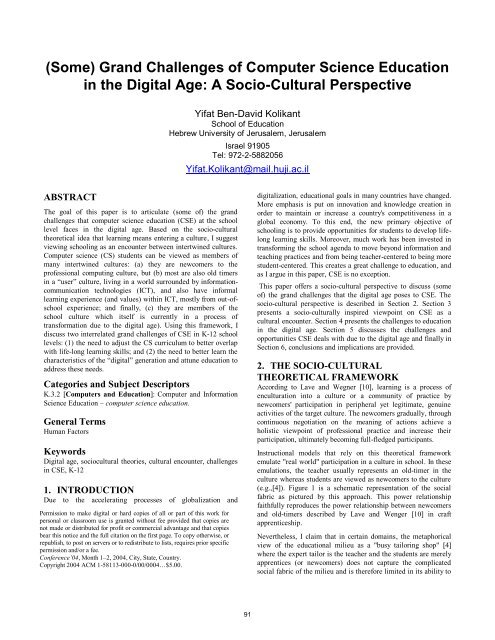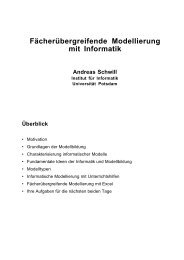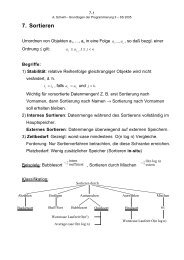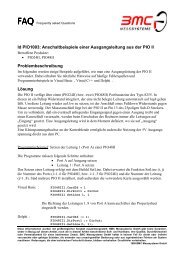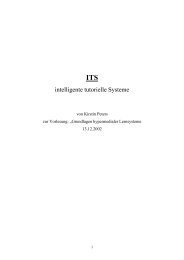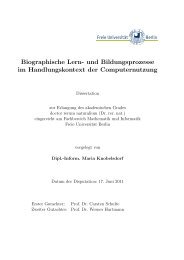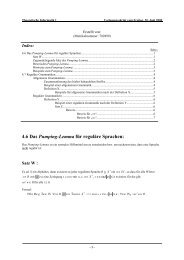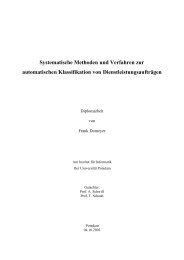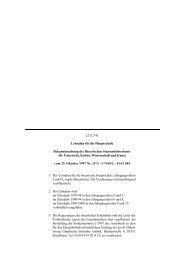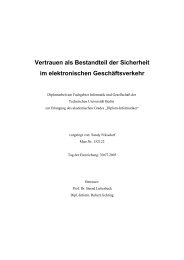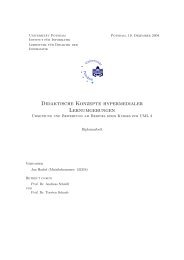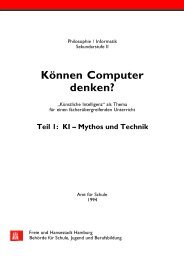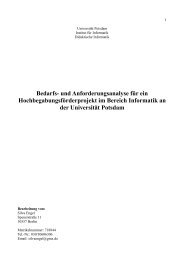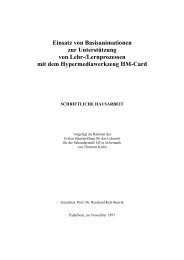Maria Knobelsdorf, University of Dortmund, Germany - Didaktik der ...
Maria Knobelsdorf, University of Dortmund, Germany - Didaktik der ...
Maria Knobelsdorf, University of Dortmund, Germany - Didaktik der ...
Create successful ePaper yourself
Turn your PDF publications into a flip-book with our unique Google optimized e-Paper software.
(Some) Grand Challenges <strong>of</strong> Computer Science Education<br />
in the Digital Age: A Socio-Cultural Perspective<br />
ABSTRACT<br />
The goal <strong>of</strong> this paper is to articulate (some <strong>of</strong>) the grand<br />
challenges that computer science education (CSE) at the school<br />
level faces in the digital age. Based on the socio-cultural<br />
theoretical idea that learning means entering a culture, I suggest<br />
viewing schooling as an encounter between intertwined cultures.<br />
Computer science (CS) students can be viewed as members <strong>of</strong><br />
many intertwined cultures: (a) they are newcomers to the<br />
pr<strong>of</strong>essional computing culture, but (b) most are also old timers<br />
in a “user” culture, living in a world surrounded by informationcommunication<br />
technologies (ICT), and also have informal<br />
learning experience (and values) within ICT, mostly from out-<strong>of</strong>school<br />
experience; and finally, (c) they are members <strong>of</strong> the<br />
school culture which itself is currently in a process <strong>of</strong><br />
transformation due to the digital age). Using this framework, I<br />
discuss two interrelated grand challenges <strong>of</strong> CSE in K-12 school<br />
levels: (1) the need to adjust the CS curriculum to better overlap<br />
with life-long learning skills; and (2) the need to better learn the<br />
characteristics <strong>of</strong> the “digital” generation and attune education to<br />
address these needs.<br />
Categories and Subject Descriptors<br />
K.3.2 [Computers and Education]: Computer and Information<br />
Science Education – computer science education.<br />
General Terms<br />
Human Factors<br />
Keywords<br />
Digital age, sociocultural theories, cultural encounter, challenges<br />
in CSE, K-12<br />
1. INTRODUCTION<br />
Due to the accelerating processes <strong>of</strong> globalization and<br />
Permission to make digital or hard copies <strong>of</strong> all or part <strong>of</strong> this work for<br />
personal or classroom use is granted without fee provided that copies are<br />
not made or distributed for pr<strong>of</strong>it or commercial advantage and that copies<br />
bear this notice and the full citation on the first page. To copy otherwise, or<br />
republish, to post on servers or to redistribute to lists, requires prior specific<br />
permission and/or a fee.<br />
Conference’04, Month 1–2, 2004, City, State, Country.<br />
Copyright 2004 ACM 1-58113-000-0/00/0004…$5.00.<br />
Yifat Ben-David Kolikant<br />
School <strong>of</strong> Education<br />
Hebrew <strong>University</strong> <strong>of</strong> Jerusalem, Jerusalem<br />
Israel 91905<br />
Tel: 972-2-5882056<br />
Yifat.Kolikant@mail.huji.ac.il<br />
91<br />
digitalization, educational goals in many countries have changed.<br />
More emphasis is put on innovation and knowledge creation in<br />
or<strong>der</strong> to maintain or increase a country's competitiveness in a<br />
global economy. To this end, the new primary objective <strong>of</strong><br />
schooling is to provide opportunities for students to develop lifelong<br />
learning skills. Moreover, much work has been invested in<br />
transforming the school agenda to move beyond information and<br />
teaching practices and from being teacher-centered to being more<br />
student-centered. This creates a great challenge to education, and<br />
as I argue in this paper, CSE is no exception.<br />
This paper <strong>of</strong>fers a socio-cultural perspective to discuss (some<br />
<strong>of</strong>) the grand challenges that the digital age poses to CSE. The<br />
socio-cultural perspective is described in Section 2. Section 3<br />
presents a socio-culturally inspired viewpoint on CSE as a<br />
cultural encounter. Section 4 presents the challenges to education<br />
in the digital age. Section 5 discusses the challenges and<br />
opportunities CSE deals with due to the digital age and finally in<br />
Section 6, conclusions and implications are provided.<br />
2. THE SOCIO-CULTURAL<br />
THEORETICAL FRAMEWORK<br />
According to Lave and Wegner [10], learning is a process <strong>of</strong><br />
enculturation into a culture or a community <strong>of</strong> practice by<br />
newcomers' participation in peripheral yet legitimate, genuine<br />
activities <strong>of</strong> the target culture. The newcomers gradually, through<br />
continuous negotiation on the meaning <strong>of</strong> actions achieve a<br />
holistic viewpoint <strong>of</strong> pr<strong>of</strong>essional practice and increase their<br />
participation, ultimately becoming full-fledged participants.<br />
Instructional models that rely on this theoretical framework<br />
emulate "real world" participation in a culture in school. In these<br />
emulations, the teacher usually represents an old-timer in the<br />
culture whereas students are viewed as newcomers to the culture<br />
(e.g.,[4]). Figure 1 is a schematic representation <strong>of</strong> the social<br />
fabric as pictured by this approach. This power relationship<br />
faithfully reproduces the power relationship between newcomers<br />
and old-timers described by Lave and Wenger [10] in craft<br />
apprenticeship.<br />
Nevertheless, I claim that in certain domains, the metaphorical<br />
view <strong>of</strong> the educational milieu as a "busy tailoring shop" [4]<br />
where the expert tailor is the teacher and the students are merely<br />
apprentices (or newcomers) does not capture the complicated<br />
social fabric <strong>of</strong> the milieu and is therefore limited in its ability to


